高中英语人教版选修九Unit 1 Breaking records Learning about Language课件(42张)
文档属性
| 名称 | 高中英语人教版选修九Unit 1 Breaking records Learning about Language课件(42张) |
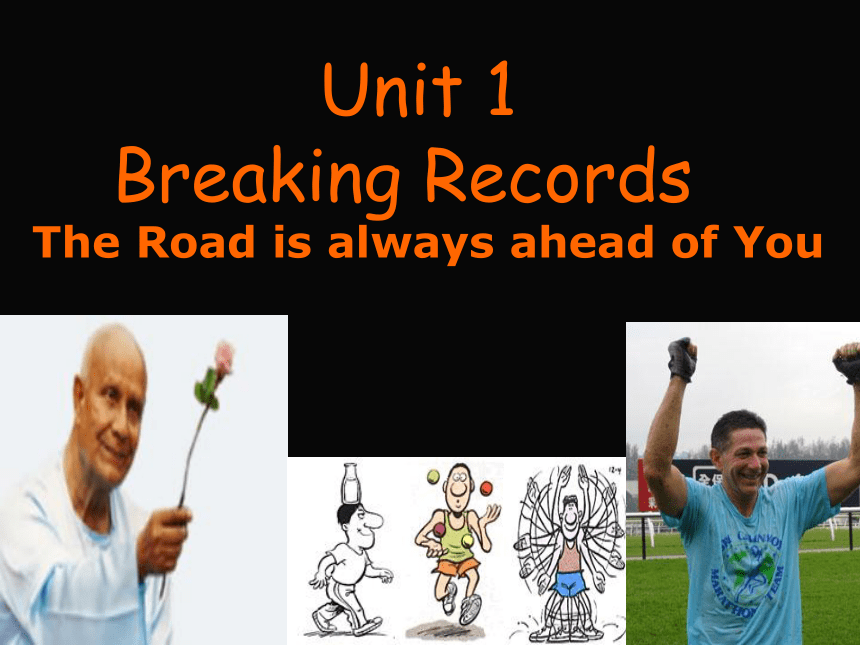
|
|
| 格式 | zip | ||
| 文件大小 | 559.9KB | ||
| 资源类型 | 教案 | ||
| 版本资源 | 人教版(新课程标准) | ||
| 科目 | 英语 | ||
| 更新时间 | 2018-08-21 00:00:00 | ||
图片预览


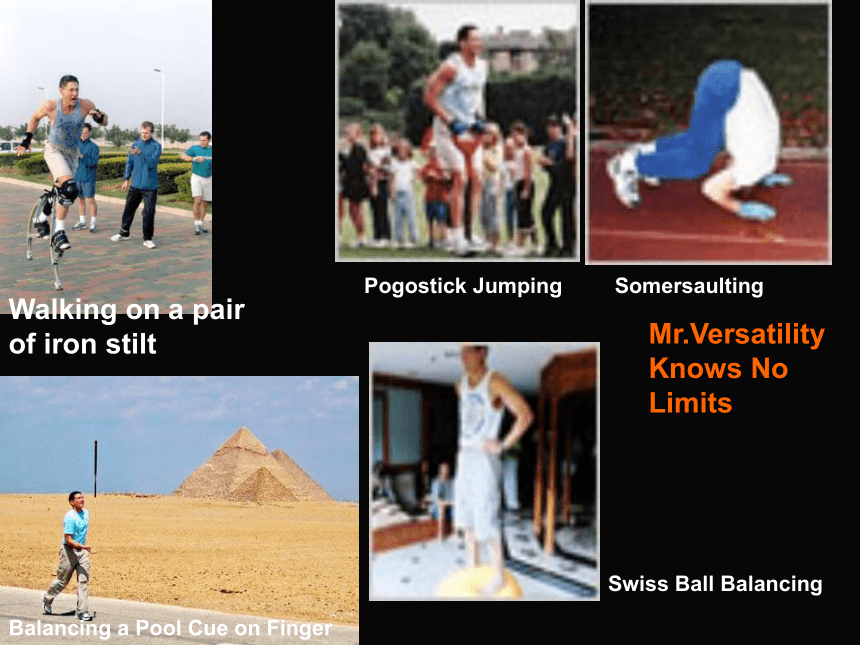
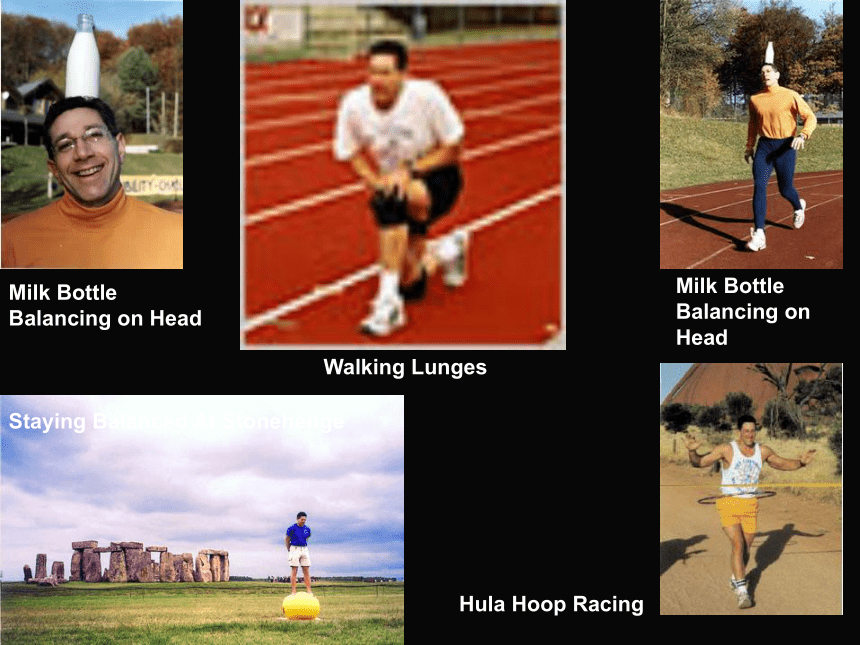
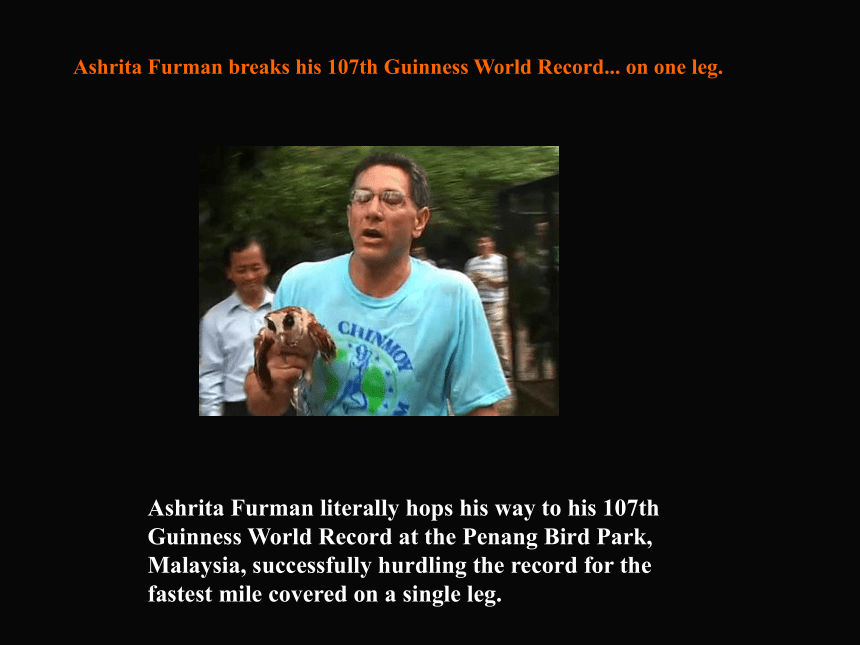


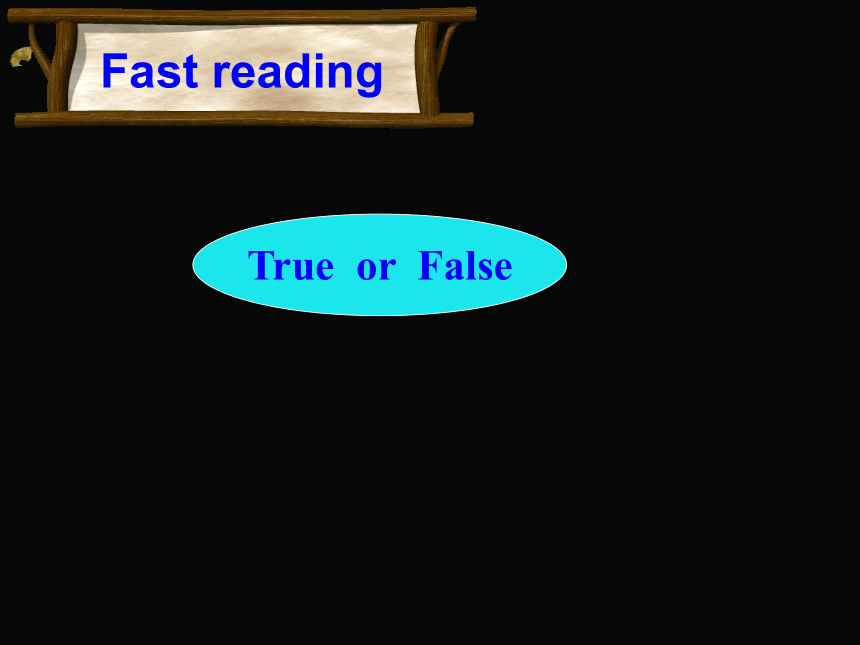


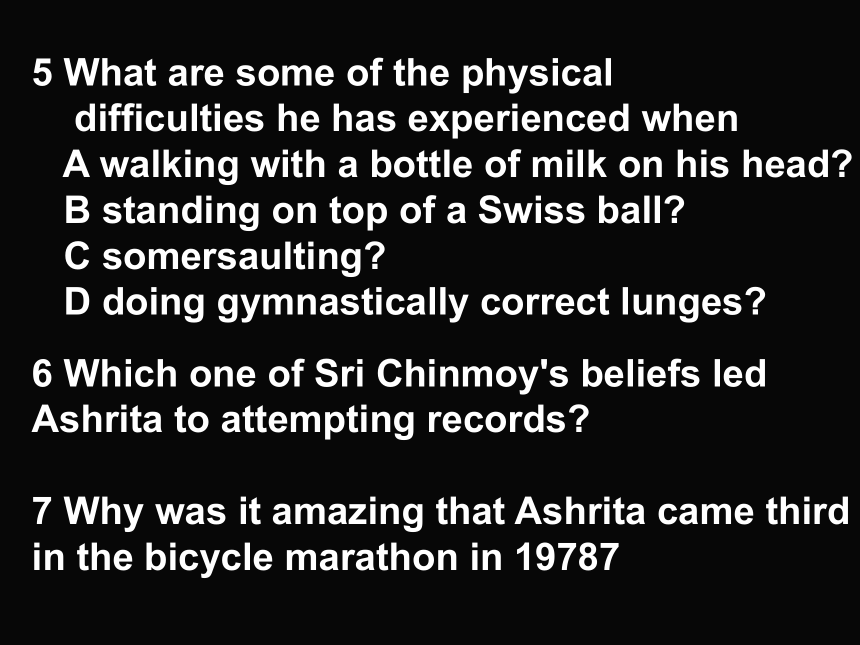

文档简介
课件42张PPT。 Unit 1
Breaking Records
The Road is always ahead of YouAshrita & Sri ChinmoyMr.Versatility Knows No Limits Pogostick Jumping Swiss Ball Balancing Somersaulting Balancing a Pool Cue on Finger Walking on a pair of iron stilt Walking Lunges Milk Bottle Balancing on Head Hula Hoop Racing Staying Balanced At StonehengeMilk Bottle Balancing on HeadAshrita Furman breaks his 107th Guinness World Record... on one leg.
Ashrita Furman literally hops his way to his 107th Guinness World Record at the Penang Bird Park, Malaysia, successfully hurdling the record for the fastest mile covered on a single leg. Why I Break RecordsAshrita with Sri Chinmoy As a kid I had a huge fascination with the exotic places and people listed in the Guinness Book of Records, but being a non-athlete, I never imagined ever actually getting a world record myself. Years later, as a teenager, I became interested in Eastern spirituality and began studying meditation with Sri Chinmoy. Suddenly, I was filled with an inner joy and a seemingly inexhaustible energy. Sri Chinmoy also taught me about his philosophy of self-transcendence, that when you have access to the divine power we all have within us, nothing is impossible. Under my teacher’s guidance, I eventually learned how to incorporate my newfound energy into my spiritual life while pursuing athletic goals, and I realized that it was time to fulfill my childhood dream of becoming a Guinness record-holder. In 1979 I set my first record by doing 27,000 jumping jacks, and it was such a thrill that I immediately began training for the next record and I haven’t stopped since! I have also been fortunate enough to travel with the group that often accompanies Sri Chinmoy on his international concert tours of music dedicated to world harmony, and I’ve had the opportunity to set records at some of the most magnificent wonders of the world. Fast readingTrue or FalseSkimmingQuickly glance through the text. Tick the topics about Ashrita that the author does not cover.
□physical skills needed for events
□ number of records broken
□ his family life
□ kinds of records broken
□ why he became a sportsman
□ countries he likes best
□ place and date of birth
□ his occupation
□ his education
□ his first Guinness recordCareful Reading Now read the story more carefully and answer the following questions in groups.
1 Where do you think Ashrita lives?
2 How old do you think he is?
3 Has he broken records in all
seven continents?
4 When did he first come across
the Guinness Book of World Records?
5 What are some of the physical
difficulties he has experienced when
A walking with a bottle of milk on his head?
B standing on top of a Swiss ball?
C somersaulting?
D doing gymnastically correct lunges?
6 Which one of Sri Chinmoy's beliefs led Ashrita to attempting records?
7 Why was it amazing that Ashrita came third in the bicycle marathon in 197878 Why did Ashrita believe he could
accomplish anything after the
bicycle marathon?
9 What happens in an event that
prevents Ashrita from giving up?
10 Do you think that the events that
Ashrita participates in are childish?
Why or why not?Language points 1. break a record打破记录
set /establish /create a new record
创造一项新记录
keep/hold a record保持记录
equal the world record平世界记录;2. approximately adv.
How much do you think it will cost, approximately?
【词汇辩义】almost, nearly, about, approximately, around, roughly
这些副词均有"大约,差不多"之意。
almost 指在程度上相差很小,差不多。
nearly与almost含义基本相同,侧重指数量、时间或空间上的接近。
about 常可分almost和nearly换用,但about用于表示时间、数量的"大约"时,实际数量可能多也可能少。
approximately 多用于书面语,指精确度接近某个标准以致误差可忽略不计。
around 多用于非正式场合,常见于美国英语。
roughly 指按精略估计,常代替about。3. Conventional adj.
1 (a) (常作贬义) based on convention 依照惯例的; 约定俗成的; 因循守旧的: conventional clothes, behaviour 老一套的衣物、 行为
She's so conventional in her views. 她的观点太保守. He made a few conventional remarks about the weather. 他说了几句关於天气的客套话.
(b) following what is traditional or customary 依照传统的; 符合习俗的: a conventional design, method 传统的式样、 方法.
2 (esp of weapons) not nuclear (尤指武器)常规的, 非核的: conventional missiles, warfare, etc 常规的导弹、 战争等 a conventional power station, ie fuelled by oil or coal, rather than being powered by a nuclear reactor 使用普通燃料的发电厂(以石油或煤为燃料而非使用核动力的). He is conventional in his approach to life. conventionally adverb ?Internet connections through conventional phone lines are fairly slow.traditionaladj according to or being tradition 按照传统的; 传统的:
It's traditional in England to eat turkey on Christmas Day. 圣诞节时吃火鸡是英格兰的传统. * country people in their traditional costumes, ie of a type worn for many centuries 穿著传统服装的乡村居民. traditionally adv: In England, turkey is traditionally eaten on Christmas Day. 在英格兰, 圣诞节时按传统要吃火鸡. 4. rather adv.
1).rather可以修饰形容词、副词的原级、比较级等;可以与介词短语连用.
2).rather放在不定冠词a(n)前后均可.如:have got a rather(=rather a)good voice.
3).用作副词,意为"宁可,宁愿" , rather than意为"而不是;与其……不如",后接名词、代词、形容词、动词原形等;would rather do...than do...=would do...rather than do...宁愿做……而不愿做……;prefer to do...rather than do...宁愿做……而不愿做…;
4).用作感叹词,意为"当然" --Would you like a swim? --Rather. 5)习惯用语及搭配
a). or rather更确切,更恰当;更接近.
b). would rather意为"宁愿",后接动词原形,其否定形式是would rather not do.
c).I would rather that...这是虚拟语气形式,若从句表示与现在或将来的情况相反,用一般过去时;与过去的事实相反,用过去完成时. 【词汇辩义】fairly, pretty, quite, rather all used to say that something is true to some degree, but not completely or extremely这些程度副词都有“相当,颇”之意。 fairly语意最弱,多用于褒义,表示适度地、尚可的意思。不可与too或比较级连用。 pretty用法与rather相似。常用于非正式文体。 quite含义比fairly稍强,与不定冠词连用时,一般放在不定冠词之前。It took quite a long time (NOT a quite long time).
? You are quite wrong.
? I quite understand your feelings.
rather语气比quite强,褒意贬意都可使用。用作程度副词,意为"稍微;有点;颇;相当" attempt v. to try to do something, especially something difficult试图
1) The second question was so difficult I didn't even attempt it.
2) He attempted to leave but was stopped.
3) I attempted walking along the rope.
4) The old lady lived, so her attacker was charged with attempted murder, not murder.
n. an effort or a try 尝试;
1) He failed to set a new record, but it was a good attempt.
2) I passed my driving test at the third attempt.
3) The government announced big tax cuts in an attempt to regain its lost popularity.
4) Could you at least make an attempt to smile?【真题回放】
⑴ He ____ to escape from the prison, but he couldn’t find anybody to help him.
A. succeeded B. attempted C. advised D. offered (B)
⑵ Shelly had prepared carefully for her English examination so that he could be sure of passing it on her first _______. A. intention B. attempt C. purpose D. desire (B)
【迷你考场】
--I think I can’t achieve my aims.
-- In my opinion, you shouldn’t ______ such a difficult task.
attempt B. have attempted
C. manage D. have managed
It was a great _____ for him to be pleasant to people he didn't like.
A. attempt B. trouble C. power D. effortWhile these activities might seem childish and cause laughter rather than respect, in reality they require an enormous amount of strength and fitness as well as determination.
【知识串讲】while引导让步状语从句, 意思为“尽管”.
【真题回放】 _________ I accept that he is not perfect, I do actually like the person. (04江苏)
A .while B. Since
C. Before D. Unless (A)
rather than prep.
instead of; in preference to (sb/sth)
在大多数情况下,rather?than两侧的句子结构是对称的,但也有不对称现象.
1)?The?color?seems?green?rather?than?blue.(两侧均为形容词) 2)?The?dictator?relied?on?abuse?of?his?opponents.(两侧均为介词短语)?? 3)?It?was?what?he?meant?rather?than?what?he?said?that?annoyed?me.(两侧均为what引导的名词性从句) 4)?They?hope?that?reason?rather?than?prejudice?would?prevail?in?the?community.(两侧均为名词) 5)?He?was?bolting?his?food?rather?than?eating?it.(两侧均为动词的过去进行时,只不过eating前省略了was)? 6)?These?measures?will?aggravate(使---恶化)?rather?than?relieve?the?situation.(两侧均为动词的一般将来时,只不过relieve前省略了will) 7)?He?should?be?rewarded?rather?than?punished?.(两侧均为should+动词不定式一般式的被动形式,只不过punished前省略了should?be) 8)?He?ran?rather?than?walked.(两侧均为动词的一般过去时) 9)?He?insisted?on?staying?rather?than?go. (不对称,不太情愿做的事,大体相当于 “而不愿”in reality=in actual fact
We thought they had come to repair the phone, but in reality they were burglars.
Reality n.(C. & U.)something or anything that is real
One’s dream becomes a reality.
put one’s dream/wishes into realty
escape from realty
tough adj. difficult to do or deal with:
It was a tough race.
She' s had a tough life.
The company admitted that it had been a tough year.
Tough decisions will have to be made.
The reporters were asking a lot of tough questions.
have a tough time (of it) (=face a lot of difficult problems)
The family has had a tough time of it these last few months.
it's tough doing something
It's tough being married to a cop.
be tough on somebody (=cause problems for someone or make their life difficult)
Having to stay indoors all day is tough on a kid.Extreme adj.
1 [only before noun] very great in degree:
Extreme poverty still exists in many rural areas.
extreme care/caution
It is necessary to use extreme caution with chemicals.
extreme cold
He had extreme difficulty getting hold of the ingredients.
2 very unusual and severe or serious
extreme example/case
an extreme case of cruelty
Force is only justified in extreme circumstances.
extreme weather/conditions etcextremely ??adverb very: They played extremely well. She's extremely beautiful. extreme ??noun [C] the largest possible amount or degree of something: I've never witnessed such extremes of wealth and poverty. Most people I know work fairly hard but she takes it to extremes. My moods seem to go from one extreme to another (= my moods often change from very bad to very good). allow v.允许,容许 allow sb.to do sth.允许某人做某事 ;allow doing sth.允许做某事 ;allow vt. 给予(时间、金钱);同意给予。后常接双宾语。 例如; 1) He allows his wife $200 a month for clothes. 2) Allow me one minute in which to change my clothes. 3) Please allow yourself an hour to get to the airport. allow for顾及,考虑到 This journey usually takes 3 weeks, but you should allow for delays caused by bad weather. We must allow for the train being late—it always is. You can’t make it in an hour;you must allow for the heavy traffic. 【词汇辩义】permit, allow
这两个词都是“许可,允许”之意,用法正式;而且都表示有能力或权威去阻止的含义。
permit意为“准许,允许”,比allow更为正式,严肃,指有权允许的一方积极、明确地从正面允许或持肯定态度。例如1) The distance between the two cities was in those days too great to permit of frequent contact. 2) In the wall of the cabin there is a hole to permit light to enter.
allow意为“许可,准许”,其实表达的意思是并不反对,不加阻止或客观条件的可行性,偏重“听任”,意义较消极。可用于复合结构,即allow sb./sth. to do sth.。常用词组:allow for考虑到具体情况;allow of (no delay/ no dispute)许可,承认(刻不容缓,没有争论余地)。例如:1) The nurse allowed the visitors to remain beyond the hospital visiting hours, though it was not permitted. 2) I want to get a good business or profession which allows me to get away when I want to. 3) Being the principal of a high school, Jane's position allowed of no unseemly behavior in public. come (get) to 后常接know, understand, love, like, live, be, realize等动词,表示 “渐渐开始” 之意.
【【迷你考场】With time passing by, the boy _______ to understand why his father was so strict with him.
A. turned B. came C. became D. grew
Key: Blimit n.限度,界限,极限,限量.within limits适度地,有限度地. Without limit无限地,无限制地. Limit vt. 限定某人(某事物) 例如:
⑴.The speed limit on this road is 70 pmh.
⑵. There is a limit to how much I’m prepared to spend.
⑶.There’s just about no limit to what you can do about this.
【迷你考场】完成下列句子:
⑴.We must try and _______________________(限制我们的开支).
⑵. I’m willing to help, ___________________(适当地).
⑶. No fishing is allowed ________________________(二十英里范围内).
Key: ⑴. limit our expenditure. ⑵.within limits ⑶.within a twenty-mile limit.come to an/the understanding that…达到某种情况或状态, 对某事物的原因,意义和重要性的了解,that引导同位语从句. accomplish vt. 完成,做成功,实现: accomplish one’s aim(a task); a man who will never accomplish anything. accomplish,complete,end,finish都含有"完成"之意,他们的区别是: accomplish 指成功地完成预期的计划或达到预期的目的或成果 complete 指完成一件指派或预定的任务,或完善、完整未完成的部分 end 指一个动作或一件事情的结束或终止 finish 指把一件事或一个动作做完,强调事情的了结、终止
【迷你考场】
A.完成下列句子:
⑴.We need to __________________(达到更好理解) of how these machines work and where they should be used
⑵. _______________(根据我得理解)we would meet here.
Key: ⑴ come to a better understanding ⑵ My understanding was that B. 练习(选择最恰当的答案):
⑴.We tried to settle the argument but ___ nothing.
A. accomplished B. completed C. ended D. finished
⑵.The term will ___ early in July.
A. accomplish B. complete C. end D. finish
⑶.The building was ___ in 1962..
A. accomplished B. completed C. ended D. finished
⑷.When will the work be ___.
A. accomplished B. completed C. ended D. finished
⑸.比较:I have finished the book.和I have completed a book.分别释为何意呢?
Key: ⑴ A ⑵ C ⑶ D ⑷ B ⑸ I have finished the book.我读完了那本书.
I have completed a book.我写完了一本书.acknowledge v. 接受;承认;认为
acknowledge doing sth.
She acknowledged having been frightened.
acknowledge + that-clause
She acknowledged that she had been frightened.
acknowledge sth.
You must acknowledge the truth of her argument.
They refused to acknowledge the new government.
acknowledge—as / to be = to accept or recognize 承认;认可
She is acknowledged as / to be their best tennis player.
acknowledgement n. 承认,致谢,答谢
in acknowledgement of 承认…;感谢…; 以…表谢意
He was given a gold watch in acknowledgement f his work for the company.【迷你考场】
⑴ He the fact that he had made a mistake.
A. accounted B. permitted C. allowed D. acknowledged
⑵ He is widely acknowledged being the best player in the world.
A. as B. of C. to D. for
⑶ I gratefully financial support from several local businesses.
A. express B. convey C. exhibit D. acknowledge
(4) In this factory, suggestions often have to wait for months before they are fully _____.
A. admitted B. acknowledged C. absorbed D. considered
Key: ⑴ D ⑵A ⑶D (4) D引导时间状语从句除了用when, while, before, after等从属连词外,一些短语如the moment(minute, instant), every time, the next time, the last time, by the time等,以及immediately, directly, instantly等词都可以引导时间状语从句.例如:
Every time I saw him, he always devoted himself to his work.每次我见到他的时候,他都在全身心地工作.where引导定语从句,先行词是point,类似表示地点,处所,情况,状态的名词做先行词时,定语从句多用where 引导,这样的名词有:place, room, point, situation, condition, case, occasion等.
deep adv. 例如: They dived deep into the ocean./ Still water runs deep.
【真题回放】
【迷你考场】练习(选择最恰当的答案):
①Have you thought a situation________ this idiom can be used?
A. when B. where C. for which D. why
②In a sports team each player has a clear role, and there are few occasions members are confused or uncertain of their roles.
A. when B. where C. why D. how
I thought her nice and honest ____ I met her.
A. first time B. for the first time C. the first time D. by the first time
I shall take you back to Beijing _____ you are well enough to travel.
A. presently B. promptly C. immediately D. shortly
Key: ①B ② Urge
1 to strongly suggest that someone does something
urge somebody to do something
I got a note from Moira urging me to get in touch.
urge that
He urged that a referendum should be held by December.
urge something on/upon somebody
I have urged upon him the need for extreme secrecy.
The charity urged quick action.
2 [always + adverb/preposition] formal to make someone or something move by shouting, pushing them etc
urge somebody/something forward
He urged her forward, his hand under her elbow.
urge somebody into/towards something
She began urging him towards the front door.
urge somebody ? on phrasal verb
to encourage a person or animal to work harder, go faster etc:
Urged on by the crowd, the Italian team scored two more goals.motivation
n. eagerness and willingness to do something without needing to be told or forced to do it
[countable] the reason why you want to do something 动机;诱因;刺激They lack the motivation to study. 他们缺乏学习的积极性. What was your motivation for becoming a teacher?
?Escape can be a strong motivation for travel.devotion n.
1 [U] ~ (to sb/sth)
deep strong love 深爱; 挚爱: a mother's devotion to her children 母亲对子女深深的疼爱.
(b) giving of oneself (to a person, cause, etc); loyalty 献身; 忠心: devotion to duty 忠於职守 * a teacher's devotion to her task 教师全心全意投入其工作的态度 * our devotion to our leader 我们对领袖的忠诚.
2 [U] religious zeal; devoutness 宗教热情; 虔诚: a life of great devotion 信仰诚笃的一生.
The Road is always ahead of YouAshrita & Sri ChinmoyMr.Versatility Knows No Limits Pogostick Jumping Swiss Ball Balancing Somersaulting Balancing a Pool Cue on Finger Walking on a pair of iron stilt Walking Lunges Milk Bottle Balancing on Head Hula Hoop Racing Staying Balanced At StonehengeMilk Bottle Balancing on HeadAshrita Furman breaks his 107th Guinness World Record... on one leg.
Ashrita Furman literally hops his way to his 107th Guinness World Record at the Penang Bird Park, Malaysia, successfully hurdling the record for the fastest mile covered on a single leg. Why I Break RecordsAshrita with Sri Chinmoy As a kid I had a huge fascination with the exotic places and people listed in the Guinness Book of Records, but being a non-athlete, I never imagined ever actually getting a world record myself. Years later, as a teenager, I became interested in Eastern spirituality and began studying meditation with Sri Chinmoy. Suddenly, I was filled with an inner joy and a seemingly inexhaustible energy. Sri Chinmoy also taught me about his philosophy of self-transcendence, that when you have access to the divine power we all have within us, nothing is impossible. Under my teacher’s guidance, I eventually learned how to incorporate my newfound energy into my spiritual life while pursuing athletic goals, and I realized that it was time to fulfill my childhood dream of becoming a Guinness record-holder. In 1979 I set my first record by doing 27,000 jumping jacks, and it was such a thrill that I immediately began training for the next record and I haven’t stopped since! I have also been fortunate enough to travel with the group that often accompanies Sri Chinmoy on his international concert tours of music dedicated to world harmony, and I’ve had the opportunity to set records at some of the most magnificent wonders of the world. Fast readingTrue or FalseSkimmingQuickly glance through the text. Tick the topics about Ashrita that the author does not cover.
□physical skills needed for events
□ number of records broken
□ his family life
□ kinds of records broken
□ why he became a sportsman
□ countries he likes best
□ place and date of birth
□ his occupation
□ his education
□ his first Guinness recordCareful Reading Now read the story more carefully and answer the following questions in groups.
1 Where do you think Ashrita lives?
2 How old do you think he is?
3 Has he broken records in all
seven continents?
4 When did he first come across
the Guinness Book of World Records?
5 What are some of the physical
difficulties he has experienced when
A walking with a bottle of milk on his head?
B standing on top of a Swiss ball?
C somersaulting?
D doing gymnastically correct lunges?
6 Which one of Sri Chinmoy's beliefs led Ashrita to attempting records?
7 Why was it amazing that Ashrita came third in the bicycle marathon in 197878 Why did Ashrita believe he could
accomplish anything after the
bicycle marathon?
9 What happens in an event that
prevents Ashrita from giving up?
10 Do you think that the events that
Ashrita participates in are childish?
Why or why not?Language points 1. break a record打破记录
set /establish /create a new record
创造一项新记录
keep/hold a record保持记录
equal the world record平世界记录;2. approximately adv.
How much do you think it will cost, approximately?
【词汇辩义】almost, nearly, about, approximately, around, roughly
这些副词均有"大约,差不多"之意。
almost 指在程度上相差很小,差不多。
nearly与almost含义基本相同,侧重指数量、时间或空间上的接近。
about 常可分almost和nearly换用,但about用于表示时间、数量的"大约"时,实际数量可能多也可能少。
approximately 多用于书面语,指精确度接近某个标准以致误差可忽略不计。
around 多用于非正式场合,常见于美国英语。
roughly 指按精略估计,常代替about。3. Conventional adj.
1 (a) (常作贬义) based on convention 依照惯例的; 约定俗成的; 因循守旧的: conventional clothes, behaviour 老一套的衣物、 行为
She's so conventional in her views. 她的观点太保守. He made a few conventional remarks about the weather. 他说了几句关於天气的客套话.
(b) following what is traditional or customary 依照传统的; 符合习俗的: a conventional design, method 传统的式样、 方法.
2 (esp of weapons) not nuclear (尤指武器)常规的, 非核的: conventional missiles, warfare, etc 常规的导弹、 战争等 a conventional power station, ie fuelled by oil or coal, rather than being powered by a nuclear reactor 使用普通燃料的发电厂(以石油或煤为燃料而非使用核动力的). He is conventional in his approach to life. conventionally adverb ?Internet connections through conventional phone lines are fairly slow.traditionaladj according to or being tradition 按照传统的; 传统的:
It's traditional in England to eat turkey on Christmas Day. 圣诞节时吃火鸡是英格兰的传统. * country people in their traditional costumes, ie of a type worn for many centuries 穿著传统服装的乡村居民. traditionally adv: In England, turkey is traditionally eaten on Christmas Day. 在英格兰, 圣诞节时按传统要吃火鸡. 4. rather adv.
1).rather可以修饰形容词、副词的原级、比较级等;可以与介词短语连用.
2).rather放在不定冠词a(n)前后均可.如:have got a rather(=rather a)good voice.
3).用作副词,意为"宁可,宁愿" , rather than意为"而不是;与其……不如",后接名词、代词、形容词、动词原形等;would rather do...than do...=would do...rather than do...宁愿做……而不愿做……;prefer to do...rather than do...宁愿做……而不愿做…;
4).用作感叹词,意为"当然" --Would you like a swim? --Rather. 5)习惯用语及搭配
a). or rather更确切,更恰当;更接近.
b). would rather意为"宁愿",后接动词原形,其否定形式是would rather not do.
c).I would rather that...这是虚拟语气形式,若从句表示与现在或将来的情况相反,用一般过去时;与过去的事实相反,用过去完成时. 【词汇辩义】fairly, pretty, quite, rather all used to say that something is true to some degree, but not completely or extremely这些程度副词都有“相当,颇”之意。 fairly语意最弱,多用于褒义,表示适度地、尚可的意思。不可与too或比较级连用。 pretty用法与rather相似。常用于非正式文体。 quite含义比fairly稍强,与不定冠词连用时,一般放在不定冠词之前。It took quite a long time (NOT a quite long time).
? You are quite wrong.
? I quite understand your feelings.
rather语气比quite强,褒意贬意都可使用。用作程度副词,意为"稍微;有点;颇;相当" attempt v. to try to do something, especially something difficult试图
1) The second question was so difficult I didn't even attempt it.
2) He attempted to leave but was stopped.
3) I attempted walking along the rope.
4) The old lady lived, so her attacker was charged with attempted murder, not murder.
n. an effort or a try 尝试;
1) He failed to set a new record, but it was a good attempt.
2) I passed my driving test at the third attempt.
3) The government announced big tax cuts in an attempt to regain its lost popularity.
4) Could you at least make an attempt to smile?【真题回放】
⑴ He ____ to escape from the prison, but he couldn’t find anybody to help him.
A. succeeded B. attempted C. advised D. offered (B)
⑵ Shelly had prepared carefully for her English examination so that he could be sure of passing it on her first _______. A. intention B. attempt C. purpose D. desire (B)
【迷你考场】
--I think I can’t achieve my aims.
-- In my opinion, you shouldn’t ______ such a difficult task.
attempt B. have attempted
C. manage D. have managed
It was a great _____ for him to be pleasant to people he didn't like.
A. attempt B. trouble C. power D. effortWhile these activities might seem childish and cause laughter rather than respect, in reality they require an enormous amount of strength and fitness as well as determination.
【知识串讲】while引导让步状语从句, 意思为“尽管”.
【真题回放】 _________ I accept that he is not perfect, I do actually like the person. (04江苏)
A .while B. Since
C. Before D. Unless (A)
rather than prep.
instead of; in preference to (sb/sth)
在大多数情况下,rather?than两侧的句子结构是对称的,但也有不对称现象.
1)?The?color?seems?green?rather?than?blue.(两侧均为形容词) 2)?The?dictator?relied?on?abuse?of?his?opponents.(两侧均为介词短语)?? 3)?It?was?what?he?meant?rather?than?what?he?said?that?annoyed?me.(两侧均为what引导的名词性从句) 4)?They?hope?that?reason?rather?than?prejudice?would?prevail?in?the?community.(两侧均为名词) 5)?He?was?bolting?his?food?rather?than?eating?it.(两侧均为动词的过去进行时,只不过eating前省略了was)? 6)?These?measures?will?aggravate(使---恶化)?rather?than?relieve?the?situation.(两侧均为动词的一般将来时,只不过relieve前省略了will) 7)?He?should?be?rewarded?rather?than?punished?.(两侧均为should+动词不定式一般式的被动形式,只不过punished前省略了should?be) 8)?He?ran?rather?than?walked.(两侧均为动词的一般过去时) 9)?He?insisted?on?staying?rather?than?go. (不对称,不太情愿做的事,大体相当于 “而不愿”in reality=in actual fact
We thought they had come to repair the phone, but in reality they were burglars.
Reality n.(C. & U.)something or anything that is real
One’s dream becomes a reality.
put one’s dream/wishes into realty
escape from realty
tough adj. difficult to do or deal with:
It was a tough race.
She' s had a tough life.
The company admitted that it had been a tough year.
Tough decisions will have to be made.
The reporters were asking a lot of tough questions.
have a tough time (of it) (=face a lot of difficult problems)
The family has had a tough time of it these last few months.
it's tough doing something
It's tough being married to a cop.
be tough on somebody (=cause problems for someone or make their life difficult)
Having to stay indoors all day is tough on a kid.Extreme adj.
1 [only before noun] very great in degree:
Extreme poverty still exists in many rural areas.
extreme care/caution
It is necessary to use extreme caution with chemicals.
extreme cold
He had extreme difficulty getting hold of the ingredients.
2 very unusual and severe or serious
extreme example/case
an extreme case of cruelty
Force is only justified in extreme circumstances.
extreme weather/conditions etcextremely ??adverb very: They played extremely well. She's extremely beautiful. extreme ??noun [C] the largest possible amount or degree of something: I've never witnessed such extremes of wealth and poverty. Most people I know work fairly hard but she takes it to extremes. My moods seem to go from one extreme to another (= my moods often change from very bad to very good). allow v.允许,容许 allow sb.to do sth.允许某人做某事 ;allow doing sth.允许做某事 ;allow vt. 给予(时间、金钱);同意给予。后常接双宾语。 例如; 1) He allows his wife $200 a month for clothes. 2) Allow me one minute in which to change my clothes. 3) Please allow yourself an hour to get to the airport. allow for顾及,考虑到 This journey usually takes 3 weeks, but you should allow for delays caused by bad weather. We must allow for the train being late—it always is. You can’t make it in an hour;you must allow for the heavy traffic. 【词汇辩义】permit, allow
这两个词都是“许可,允许”之意,用法正式;而且都表示有能力或权威去阻止的含义。
permit意为“准许,允许”,比allow更为正式,严肃,指有权允许的一方积极、明确地从正面允许或持肯定态度。例如1) The distance between the two cities was in those days too great to permit of frequent contact. 2) In the wall of the cabin there is a hole to permit light to enter.
allow意为“许可,准许”,其实表达的意思是并不反对,不加阻止或客观条件的可行性,偏重“听任”,意义较消极。可用于复合结构,即allow sb./sth. to do sth.。常用词组:allow for考虑到具体情况;allow of (no delay/ no dispute)许可,承认(刻不容缓,没有争论余地)。例如:1) The nurse allowed the visitors to remain beyond the hospital visiting hours, though it was not permitted. 2) I want to get a good business or profession which allows me to get away when I want to. 3) Being the principal of a high school, Jane's position allowed of no unseemly behavior in public. come (get) to 后常接know, understand, love, like, live, be, realize等动词,表示 “渐渐开始” 之意.
【【迷你考场】With time passing by, the boy _______ to understand why his father was so strict with him.
A. turned B. came C. became D. grew
Key: Blimit n.限度,界限,极限,限量.within limits适度地,有限度地. Without limit无限地,无限制地. Limit vt. 限定某人(某事物) 例如:
⑴.The speed limit on this road is 70 pmh.
⑵. There is a limit to how much I’m prepared to spend.
⑶.There’s just about no limit to what you can do about this.
【迷你考场】完成下列句子:
⑴.We must try and _______________________(限制我们的开支).
⑵. I’m willing to help, ___________________(适当地).
⑶. No fishing is allowed ________________________(二十英里范围内).
Key: ⑴. limit our expenditure. ⑵.within limits ⑶.within a twenty-mile limit.come to an/the understanding that…达到某种情况或状态, 对某事物的原因,意义和重要性的了解,that引导同位语从句. accomplish vt. 完成,做成功,实现: accomplish one’s aim(a task); a man who will never accomplish anything. accomplish,complete,end,finish都含有"完成"之意,他们的区别是: accomplish 指成功地完成预期的计划或达到预期的目的或成果 complete 指完成一件指派或预定的任务,或完善、完整未完成的部分 end 指一个动作或一件事情的结束或终止 finish 指把一件事或一个动作做完,强调事情的了结、终止
【迷你考场】
A.完成下列句子:
⑴.We need to __________________(达到更好理解) of how these machines work and where they should be used
⑵. _______________(根据我得理解)we would meet here.
Key: ⑴ come to a better understanding ⑵ My understanding was that B. 练习(选择最恰当的答案):
⑴.We tried to settle the argument but ___ nothing.
A. accomplished B. completed C. ended D. finished
⑵.The term will ___ early in July.
A. accomplish B. complete C. end D. finish
⑶.The building was ___ in 1962..
A. accomplished B. completed C. ended D. finished
⑷.When will the work be ___.
A. accomplished B. completed C. ended D. finished
⑸.比较:I have finished the book.和I have completed a book.分别释为何意呢?
Key: ⑴ A ⑵ C ⑶ D ⑷ B ⑸ I have finished the book.我读完了那本书.
I have completed a book.我写完了一本书.acknowledge v. 接受;承认;认为
acknowledge doing sth.
She acknowledged having been frightened.
acknowledge + that-clause
She acknowledged that she had been frightened.
acknowledge sth.
You must acknowledge the truth of her argument.
They refused to acknowledge the new government.
acknowledge—as / to be = to accept or recognize 承认;认可
She is acknowledged as / to be their best tennis player.
acknowledgement n. 承认,致谢,答谢
in acknowledgement of 承认…;感谢…; 以…表谢意
He was given a gold watch in acknowledgement f his work for the company.【迷你考场】
⑴ He the fact that he had made a mistake.
A. accounted B. permitted C. allowed D. acknowledged
⑵ He is widely acknowledged being the best player in the world.
A. as B. of C. to D. for
⑶ I gratefully financial support from several local businesses.
A. express B. convey C. exhibit D. acknowledge
(4) In this factory, suggestions often have to wait for months before they are fully _____.
A. admitted B. acknowledged C. absorbed D. considered
Key: ⑴ D ⑵A ⑶D (4) D引导时间状语从句除了用when, while, before, after等从属连词外,一些短语如the moment(minute, instant), every time, the next time, the last time, by the time等,以及immediately, directly, instantly等词都可以引导时间状语从句.例如:
Every time I saw him, he always devoted himself to his work.每次我见到他的时候,他都在全身心地工作.where引导定语从句,先行词是point,类似表示地点,处所,情况,状态的名词做先行词时,定语从句多用where 引导,这样的名词有:place, room, point, situation, condition, case, occasion等.
deep adv. 例如: They dived deep into the ocean./ Still water runs deep.
【真题回放】
【迷你考场】练习(选择最恰当的答案):
①Have you thought a situation________ this idiom can be used?
A. when B. where C. for which D. why
②In a sports team each player has a clear role, and there are few occasions members are confused or uncertain of their roles.
A. when B. where C. why D. how
I thought her nice and honest ____ I met her.
A. first time B. for the first time C. the first time D. by the first time
I shall take you back to Beijing _____ you are well enough to travel.
A. presently B. promptly C. immediately D. shortly
Key: ①B ② Urge
1 to strongly suggest that someone does something
urge somebody to do something
I got a note from Moira urging me to get in touch.
urge that
He urged that a referendum should be held by December.
urge something on/upon somebody
I have urged upon him the need for extreme secrecy.
The charity urged quick action.
2 [always + adverb/preposition] formal to make someone or something move by shouting, pushing them etc
urge somebody/something forward
He urged her forward, his hand under her elbow.
urge somebody into/towards something
She began urging him towards the front door.
urge somebody ? on phrasal verb
to encourage a person or animal to work harder, go faster etc:
Urged on by the crowd, the Italian team scored two more goals.motivation
n. eagerness and willingness to do something without needing to be told or forced to do it
[countable] the reason why you want to do something 动机;诱因;刺激They lack the motivation to study. 他们缺乏学习的积极性. What was your motivation for becoming a teacher?
?Escape can be a strong motivation for travel.devotion n.
1 [U] ~ (to sb/sth)
deep strong love 深爱; 挚爱: a mother's devotion to her children 母亲对子女深深的疼爱.
(b) giving of oneself (to a person, cause, etc); loyalty 献身; 忠心: devotion to duty 忠於职守 * a teacher's devotion to her task 教师全心全意投入其工作的态度 * our devotion to our leader 我们对领袖的忠诚.
2 [U] religious zeal; devoutness 宗教热情; 虔诚: a life of great devotion 信仰诚笃的一生.
